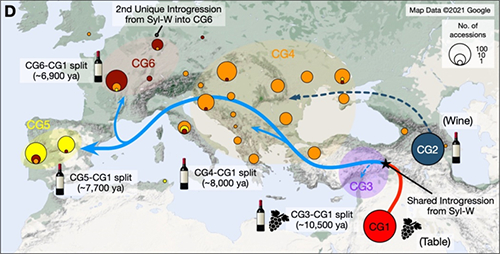Chinese Scholars and Overseas Collaborators Make Progress in the Study of Grapevine Domestication History
With the support of the National Natural Science Foundation of China (Grant Number: 32070599) and other funding agencies, Drs. Wei Chen and Jun Sheng from Yunnan Agricultural University and Dr. Shaohua Li from the Institute of Botany, Chinese Academy of Sciences collaborated with more than 40 overseas research groups to investigate the grapevine domestication history and trait origin by utilizing the genetic information of a global grape cohort. Their findings were published in the March 3rd issue of Science as a cover story, entitled “Dual domestications and origin of traits in grapevine evolution”.
Article link: https://www.science.org/doi/10.1126/science.add8655.
Ancient humans depended on the domestication of animals and plants for a sustainable food source. Despite an important role in the thousands of years of human civilization, the evolutionary origin of grapevine remains elusive. The time, location, and route of the wild grapes evolving into cultivated grapes are outstanding scientific questions. The team of Wei Chen and collaborators applied population genomic analyses to 3,525 wild and cultivated grapevines worldwide and systematically investigated the genetic variations. They first found that in the Pleistocene, harsh climate change resulted in continuous fragmentation of the wild grape habitat thereby leading to the separation of wild grape ecotypes. About 11,000 years ago, ancient humans in Western Asia and the Caucasus separately domesticated local wild grapes to obtain table and wine grapes. The researchers also found that, as early farmers dispersed across Europe, the Western Asia domesticates received genetic information from the Western wild ecotypes through introgression. This event created muscat and unique western wine grapes along the early human dispersal routes. In addition, the researchers provided new insights into the genetic basis for selecting berry palatability, flower hermaphroditism, muscat flavor, and berry color. This up-to-date evidence supports grapevine being the first domesticated fruit crop in the human history and reveals an essential role of grapevine domestications in the early development of agriculture in the Eurasian continent. This achievement is important for the ongoing research of the origin of human civilization and the investigation of many other fruit crops.

Figure. Schematic illustration of the grapevine domestication history.
Contact Us

National Natural Science Foundation of China
Add: 83 Shuangqing Rd., Haidian District, Beijing, China
Postcode: 100085
Tel: 86-10-62327001
Fax: 86-10-62327004
E-mail: bic@nsfc.gov.cn
